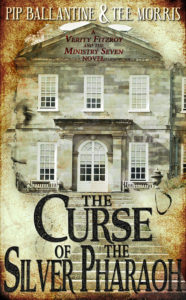 Recently, The Curse of the Silver Pharaoh went live on Amazon, print editions premiering this week at the Maryland Renaissance Festival, provided we get no unforeseen whammies from CreateSpace. (Thanks, Hurricane Matthew!) Silver Pharaoh is not my first novel, nor is it my first foray into steampunk, as many of you know. The thing about this book that has me fidgeting nervously as reviews start to trickle in is that Silver Pharaoh is my first step into the realm of Young Adult fiction.
Recently, The Curse of the Silver Pharaoh went live on Amazon, print editions premiering this week at the Maryland Renaissance Festival, provided we get no unforeseen whammies from CreateSpace. (Thanks, Hurricane Matthew!) Silver Pharaoh is not my first novel, nor is it my first foray into steampunk, as many of you know. The thing about this book that has me fidgeting nervously as reviews start to trickle in is that Silver Pharaoh is my first step into the realm of Young Adult fiction.
And that terrifies me. Greatly.
I’ve got a lot of feelings about Y.A. Fiction, one being that those reading Y.A. are not necessarily “young†adults. Think about it—while Harry Potter could be easily dismissed as a “kid’s book†and is found in the Children’s sections of bookstores and libraries everywhere, just as many adults devoured the adventures of the Boy Who Lived just as ravenously as its target audience.
So, yeah, working in the wild and woolly world of Y.A. for the first time, I picked up a few things…
- Don’t treat your young adults like kids. Your Young Adult audience may actually reach into the 40-50 year old crowd, but don’t lean on them for inspiration or support. The target audience is, on average, 10-18 year olds, or the dreaded T’s of parenthood—teenagers and tweens. Yeah, people talk about teenagers as being the dark, rebellious scourge of society; but teenagers have got nothing on tweenagers. These are youngsters too old for Spy Kids but not quite old enough to watch the true crime content on the ID Channel. So exactly what can they handle? If you think it’s frustrating for you the parent, think about what it’s like for the tweenager in question. This is why you focus on the story. Stay true to the characters and the situations that you throw their way. Just don’t write you content “down†from an adult’s perspective. Teens and tweens experience a lot in Grades 6-8 of school, and when you get to High School, hints of adulthood are everywhere. They deal with politics, emotions, and difficult choices in morality. Unlike Elementary School where friendships and relationships are very much black-and-white with clear definitions, tweens and teens discover various shades of gray. Write to that.
- While you don’t want to talk down to your readers, you also don’t want to go Game of Thrones on them either. Keep the story focused. Concerning the story and staying true to characters and situations, you are wanting to keep your plotlines straightforward. Not elementary, but definitely on point. Look at The Fifth Wave, for example. There’s an alien invasion, kids are rounded up by the military, little brother and big sister are separated. Big sister sets out to find little brother. Post-apocalyptic hilarity and hijinks ensure. How about The Hunger Games? Katniss is handy with a bow-and-arrow in her impoverished District 11. She sees little sister drawn in a lottery to be in the Hunger Games, so she volunteers to go in her stead. We then follow Katniss through her training for this post-apocalyptic cross between the Olympics and Mad Max: Fury Road. In our own Curse of the Silver Pharaoh, Verity Fitzroy is asked on behalf of the Ministry of Peculiar Occurrences to go where their agents cannot: Into a school, the only clue in the kidnapping of an Egyptologist connected to one of the British Museum’s prized possessions, the Silver Pharaoh. Sure, there are a few threads connected to the main plot. What separates Young Adult from other successful series like Game of Thrones or Wheel of Time are the sub-plots and points-of-view. Young Adult tend to focus on one, maybe two POV’s at most (Harry Potter, Katniss, Em from Scott Sigler’s Alive, Tris from Divergent) as opposed to multiple characters (Jamie Lannister, Jon Snow, Cercei, Tyrion, the Stark children, etc. in Game of Thones), thereby keeping the plot in the story narrow and focused. Sure, there are exceptions, but keeping it simple leads to a more lean approach to the plot.

- While your heroes are kids, they are not necessarily prodigies. We set The Curse of the Silver Pharaoh in an academy for gifted students. Does this mean that the student body is a collection of super-geniuses able to figure out everything at the drop of a polished gear? Hardly. The “kids†(ranging in age from 10-16) are smart, sure. Whip smart. They are not, however, human Wikipedias that possess knowledge on everything. That would make them know-it-all’s very hard to connect with. They do have their passions. Henry is all about engineering on a large scale. Verity’s passions are more for smaller, clockwork devices as well as a penchant for ancient history, and Julia—while probably the smartest person in the room—knows things that make you scratch your head and wonder “Where did she pick that up?!â€Â A good template to study when it comes to the smarts of youngsters is the Holy Trinity of Hogwarts. Hermoine is the unmatched brains of the outfit. She’s got the book learning down. Lovable Ron may be considered a bit thick-headed, but he’s actually got mad skills in strategy (Wizard Chess, anyone?) and has a finger on the pulse of wizard politics as his dad works at the Ministry of Magic. And yes, while Harry is the focus of the series, he’s the good guy who finds himself constantly in trouble. A magnet for darkness, if you will. Fortunately, he’s born with raw talent. He may not always know what to do with said talent, but he manages. Kind of like Luke Skywalker crossed with The Dude. Your heroes should have strengths and weaknesses, but they should also lack experience. They’re young, after all.
 Kids curse. Fuck yes, they do. So, our daughter has made the jump to Middle School. Both Pip and I were a little nervous as she was determined to “let people know†if bad language was being spoken. Since her Elementary school was pretty strict in what we call “Wolverine Speak†she was taking it upon herself to uphold the Steve Rogers Doctrine concerning salty language. By her second week in Sixth Grade, she told us, “I’ve figured out I can’t do it. I’ve heard some things. Oh, mom, dad, I’ve heard some things… †Maybe it’s a statement of “I’m not a kid anymore.†Maybe it’s an independence or anti-establishment tactic. Or maybe it’s kids trying to be cool, and let’s call it like it is — Wolverine is a badass. Don’t be afraid to give your cute adorable fuckers potty mouths when appropriate. Depending on the background and the situation, the phrase “Okay, poo-poo’s just got real!†is not going to be enough to really communicate the seriousness of things.
Kids curse. Fuck yes, they do. So, our daughter has made the jump to Middle School. Both Pip and I were a little nervous as she was determined to “let people know†if bad language was being spoken. Since her Elementary school was pretty strict in what we call “Wolverine Speak†she was taking it upon herself to uphold the Steve Rogers Doctrine concerning salty language. By her second week in Sixth Grade, she told us, “I’ve figured out I can’t do it. I’ve heard some things. Oh, mom, dad, I’ve heard some things… †Maybe it’s a statement of “I’m not a kid anymore.†Maybe it’s an independence or anti-establishment tactic. Or maybe it’s kids trying to be cool, and let’s call it like it is — Wolverine is a badass. Don’t be afraid to give your cute adorable fuckers potty mouths when appropriate. Depending on the background and the situation, the phrase “Okay, poo-poo’s just got real!†is not going to be enough to really communicate the seriousness of things.- Even tweens and teens are a little sick of angst. If they becomes “loners†it’s not because they are brooding or misunderstood. It’s because they are establishing independence. We’re watching it with our own daughter. She’s testing the waters WAY more cunningly than she once did. Does this mean she’s becoming a bit like a Tuesday Adams, going goth, and brooding in the corner. No, she’s still chipper, charming, and a delight to be around. If she does show angst, there is something on her mind and we need to sit down and talk about it. It’s okay for your young heroes to grapple with self-doubt, with self-esteem issues, and question values in life. Turning on the brood and going with that as a character choice is not only going to get old for your characters, it is going to get old for you and your audience. Even Hamlet had moments of levity. So go light on the angst. Your characters and your audience will be happier for it.
The feedback has been positive from The Curse of the Silver Pharaoh; but there is one reader, though, we’ve been incredibly curious about for an opinion: our daughter. As a twelve year old, she’s the target audience. She’s the one that we’ve written this book for. She’s the one we’re hoping to keep on the edge of her seat with every page.
And before anyone asks—no, we’re not going to suspend PS4 privileges if she hates the book. That would be a dick move.
The hope is if we can reach her, we might reach other young readers here, there, and everywhere. Young readers are a tough crowd, safe to say, and if we can score big with our daughter then maybe we can share our stories with others.
We should know. This particular book critic, we live with.